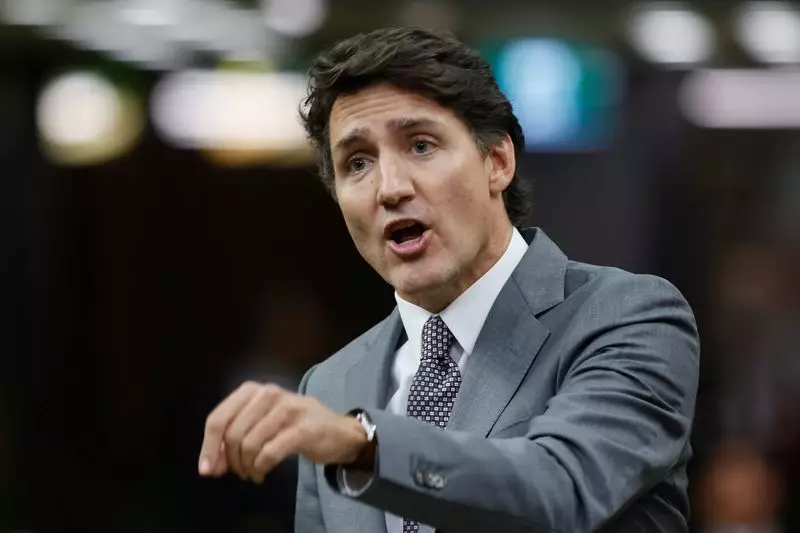The Canadian political landscape is undergoing a significant transformation as Prime Minister Justin Trudeau’s Liberal Party finds itself in a precarious position. With their popularity waning and critical elections looming, the stakes have never been higher for a party that once comfortably ruled the country. This article delves into the complexities surrounding the Liberals’ situation, particularly focusing on the special election in LaSalle—Emard—Verdun and the implications of the upcoming vote.
A Wake-Up Call in LaSalle—Emard—Verdun
The Montreal riding of LaSalle—Emard—Verdun has been a bastion of Liberal support for years, a domain where securing victory seemed almost guaranteed. However, the recent shift in public sentiment has turned this constituency into a battleground. The resignation of a Liberal legislator has prompted a special election that could serve as a litmus test for Trudeau’s leadership. Polling data suggests that the race is tighter than anticipated, raising questions about the electorate’s loyalty to a party that once seemed invincible.
The tensions within the party are palpable. Many Liberal members, including outspoken representatives from Quebec, have expressed dissatisfaction with Trudeau’s leadership. Alexandra Mendes, a notable Liberal lawmaker, voiced her constituents’ growing disenchantment with Trudeau, indicating that this discontent is not isolated but rather widespread. These internal rumbles signify that some party members recognize the critical need for change, which could lead to a reassessment of Trudeau’s role as party leader.
Trudeau has faced immense scrutiny for his handling of pressing issues, notably the persistent rise in living costs and a deepening housing crisis. As Canadians grapple with financial hardships, a growing frustration fosters an environment where voters are increasingly receptive to alternative narratives. During an interview, Trudeau acknowledged the frustrations expressed by Canadians, suggesting that rising prices and the housing situation would sway voters’ decisions in the upcoming election.
However, mere acknowledgment of voter concerns may not suffice to regain trust. As polls indicate a significant drop in support for the Liberals, the potential for losing LaSalle—Emard—Verdun would amplify pressures on Trudeau. Historical data from the 2021 general election showed the Liberals achieving 43% of the votes in this riding, dwarfing competitors such as the Bloc Québécois and the New Democratic Party. Now, as the three parties vie for dominance, the urgency for the Liberals to re-establish their footing is more pronounced than ever.
With a right-of-center Conservative Party led by Pierre Poilievre gaining traction, the threat to Trudeau’s leadership appears increasingly plausible. Polls reveal Conservatives enjoying an unprecedented level of support, with figures soaring to 45%, dwarfing the Liberals at 25%. Poilievre’s campaign, marked by promises to ditch the federal carbon tax and cap immigration until housing can catch up with demand, resonates with a segment of the electorate eager for change. This dynamic elevates the pressure on the Liberals to counteract the negative narratives that are burgeoning around them.
Moreover, the backdrop of Poilievre’s campaign, which employs tactics recognizable from the populist movements of the United States, adds another layer of complexity. The Liberal Party’s efforts to associate Poilievre with divisive political ideologies may not be enough to distract disillusioned voters. This could result in a significant shift in allegiance, with many seeking alternatives that align more closely with their pressing concerns.
The Future of the Liberal Party
As Canada approaches the next federal election slated for late 2025, the implications of the special election in LaSalle—Emard—Verdun extend far beyond one constituency. Should the Liberals fail to retain this seat, it might catalyze calls for leadership change, questioning if Trudeau’s tenure can withstand the growing tides of discontent among constituents and within his party itself.
The upcoming electoral outcome will be pivotal for the Liberal Party. The convergence of rising public dissatisfaction, the internal call for leadership change, and the competitive threat posed by the Conservatives will undoubtedly shape not just the party’s immediate future but also its legacy in Canadian politics. As Trudeau strives to maintain his position, the inevitable scrutiny and challenges may lead to a transformative phase for a party in search of redefinition and redemption.

